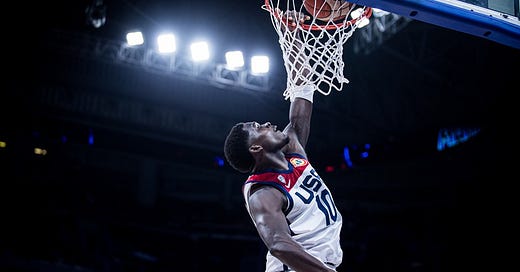Blinking out of a fishbowl
Anthony Edwards, Noah Lyles, and debating "small markets" from inside the smallest market of them all: the NBA
The clouds were persistent all throughout the day. Low, in an overcast layer that wouldn’t budge. Around 3pm, reading on the couch, I started to drowse. A bad night’s sleep catching up. I set my book on the coffee table, stretched out and closed my eyes. Captain, indignant at my legs trying to find space around his body, dropped off the couch and floppe…
Keep reading with a 7-day free trial
Subscribe to BASKETBALL FEELINGS to keep reading this post and get 7 days of free access to the full post archives.


